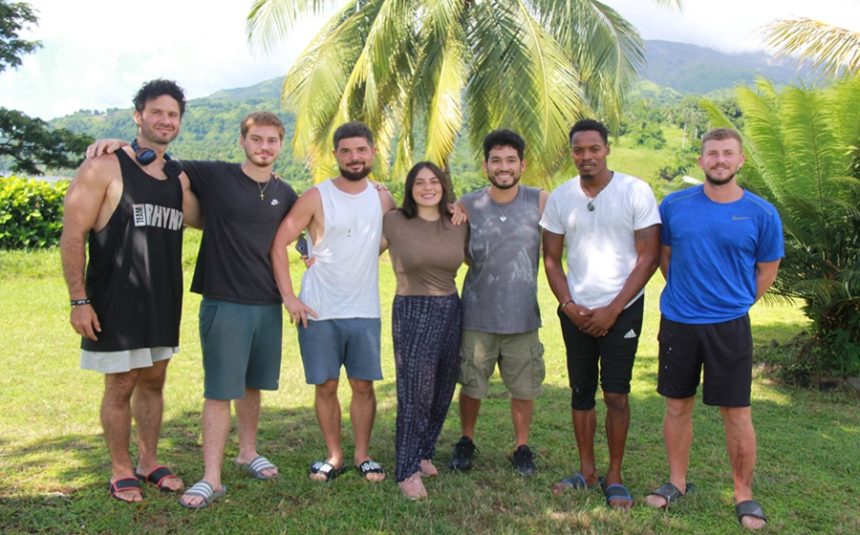Post-Beryl volunteerism gives 7 int’l students first-hand view of impact of climate change
Seven international students who have completed the climate compliance programme at Richmond Vale Academy are returning home with first-hand knowledge of the impact of climate change in St. Vincent and the Grenadines.
They are also leaving the country with hands-on experience about what can be done, at the local level, to mitigate the impact of climate change.
The students are Jose Morales, of Bolivia; Keshawn Thomas, of the United States; Callum Thomson, 27, of Edinburgh, Scotland; Jonathan Jaeger, 19, and Severin Waas, of Germany; Jorge Barrios, 34 and Nasley Quintero, both from Colombia.
During their six-month stay in SVG, they helped to restore home gardens in Mayreau, Union Island and Petit Bordel, under RVA’s backyard gardening programme.
Thomson, Jaeger, Waas and Morales spent May and June in Mayreau and Union Island, both of which were severely impacted by Hurricane Beryl, a record-breaking category 4 tropical cyclone that damaged or destroyed 95% of the built structures on those islands on July 1, 2024.
At the same time, the other team, made up of Thomas, Barrios and Quintero were busy working along with farmers in Petit Bordel, Rose Bank, Rose Hall and Troumaca, three villages in northwestern St. Vincent, as well as in Dorsetshire Hill, an upscale community north of the capital Kingstown, on the south of the island.
In Mayreau and Union Island in the Southern Grenadines, where the economy revolves around tourism and fisheries, the team’s work was focused on helping farmers build fences around their home gardens.
“Without the fencing, there was no safe land to start the crop growing,” Thomson explained.
RVA has an agreement with The Centre for Livelihoods, Ecosystems, Energy, Adaptation and Resilience in the Caribbean Ltd. (CLEAR) about creating home gardens in Maureau and Union Island, using RVAs years of experiences.
However, this was put on hold because of the devastation caused by Hurricane Beryl.
“And you don’t want to create a beautiful garden, and then all the pigs and goats come and destroy everything,” Elisabeth Axelsen, teacher at RVA explained, noting that this could cause the gardeners to loose hope.
“And then it actually really fitted with this team,” she said.
Since the hurricane, RVA had been trying to help in Union Island, and the team of students matched that intention.
“The place was like in rubble… Lots of debris on the street, everywhere, trash,” Thomson said. “We just did the fence around the perimeter of the garden”.
The fences were built of PVC or wooden posts that were planted in holes dug into the ground, with concrete used to keep them sturdy. Chain-link fence was then fastened to those posts.
The team completed 10 fences in Mayreau and also cleaned up those gardens, removing any debris that was left over from the hurricane.
“So, it was ready to start, really,” Thompson said, noting that the team worked along with gardeners who are part of the RVA’s project, and with whom the academy has signed agreements.
“Everyone was very pleased. They were just happy to have a start back to almost normal life again,” he said.
Thompson observed that there is not much fruit or vegetable production on Mayreau, a 1.5 square mile island of around 300 people.
“Fresh fruit and vegetables are hard to come by on this island, so establishing a homegarden to grow own food made sense for everyone.”
Morales was grateful for his time in Mayreau, adding that if you only study the theory about climate change, then you don’t get the full picture
. He noted that the work in the Grenadines was very focused.
“It was volunteer work, like going every morning, picking up the tools, doing the hard work. … You learn what life on a farm is like and you notice the effort it takes to wake up every morning, work in the hot sun until it’s afternoon and the heat becomes so much that you can barely even continue,” Morales explained.
He, however, concluded that it was “a necessary part” of the six-month programme. “I think it was very helpful in conveying the message that we’re trying to give people about how to live a healthy life avoiding toxins and eating organic food.
Thomson said the physical beauty of SVG lived up to the picture that most people have in their minds of the Caribbean.
“… but I’ve just never experienced the power of a hurricane or what it can do to a place,” he said, adding that this was the impression of Mayreau in his head before he visited.
“It was a surprise to see the effects. It puts into perspective the effects that a hurricane can actually have and how quickly it’s advancing.”
He noted that Beryl broke several records in how quickly it formed and the damage it caused.
“If that’s now, who’s to say in 10 years’ time, it’s not double. So, if that doesn’t make you think that the climate is changing, I don’t really know what is going to.
Morales said that most of the gardeners in Mayreau were older ladies, and they assisted his team in erecting the fences.
“So, I think it was a good example of community involvement. We didn’t even ask them, they just got in and try to help as much as they could. I think that’s a good thing to remember from this project.”
Mayreau, like the rest of the Grenadines, does not have rivers or streams, and water for cooking and cleaning is harvested from rainfall and stored in cisterns.
“One thing we all learned is the use of water — to be sensible with that, because we had two 800-gallon tanks of rainwater. And it’s different to fill up your toilet with the water buckets and shower with a bucket,” Morales said.
He said his experience in the Grenadines caused him to focus on how much water he uses ordinarily, adding that if he had used in the Grenadines the amount of water he would use at home, the tank would be dry in a few days.
“It also proves that you don’t need as much water as we use. It proves that it’s almost wasted,” Thomson commented, noting that the four-member team lived on two tanks of water for a month.
Morales said that after two months in the Grenadines, he has developed a greater appreciation for rain in arid places: “… it’s very dry down there. I don’t know if it’s linked to climate change, but I think at some point it is. So, if it rains less, it’s just less water.”
The team had similar experiences in Union Island, where they also fenced 10 gardens, built three lasagna beds on which the homeowner could plant her crops, and cleaned up three gardens.
In Union Island, they spent two weeks in each of the two major communities: Clifton and Ashton.
Jaeger said Clifton, the main town in Union Island, felt a bit more urban than in Mayreau, but the people were equally welcoming.
Meanwhile, the team that worked alongside farmers in St. Vincent also helped to rebuild fences, prepare and plant lasagna beds and prepare compost heaps.
“In most of the crops, we found a lot of natural pests like bugs and other stuff that affect the vegetables. Our work there was to clean up and buy water tanks for irrigation,” Quintero explained.
She, however, said that the most important part of their work was teaching about water management and sustainable agriculture.
They held two workshops, one at Richmond Vale Academy in Richmond, and the other in Kingstown, where the farmers and RVA students assessed needs and exchanged knowledge.
Thomas said he had come to RVA to learn in a more practical way about more nature-based solutions to climate change, “so we can counteract the destruction taking place”.
“So, for me, that’s what I came for, just to learn how, because Richmond Vale is more involved in trying to help the world. That’s what brought me here.”
Thomas said the biggest challenge for the farmers that he interacted with was having water to continue their gardening during the rainy season.
“We provided them with water tanks. That’s what they wanted,” Thomas said.
Quintero noted that RVA teaches about food security, fights against poverty, and encourages permaculture.
“But we know that some of the farmers are sellers to the big market, and they need to produce and not lose money. However, we want to figure out and teach about ways to avoid the use of chemicals,” she said.



